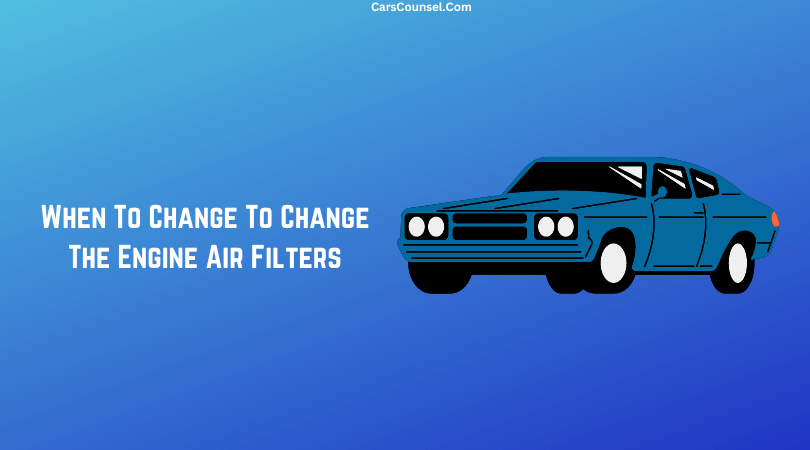Quick Navigation
Symptoms Of Dirty Air Filters
Polluted air is not doing any good to us and our car’s engines. Just as we install air filters indoors to purify oxygen, engines also have air filters. Not one, but two; engine air filters and cabin air filters.
The function of the engine filter is to prevent outside dirt, dust, and debris from entering the engine. The internal fuel combustion process uses a lot of air to create energy which is why it’s important that it should be free from impurities. The cabin filters do the same for the inside of the car so that we can breathe clean air.
A dirty air filter decreases the engine’s air supply, resulting in buildups of carbon deposits. The carbon deposits can turn into soot residue, which can get muddled with spark plug tips making them defective and can even cause an engine misfire. A mechanic can help you to solve the issue, and sometimes it can be as easy as replacing the dirty air filters in car.
Air filter replacement should be done every 2-3 years, essential for prolonging the engine’s life. This is usually a quick and inexpensive fix. The type, shape, and size of the air filters can vary based on the vehicle.
Read these air filter symptoms to prevent yourself from expensive repairs that dirty air filters in the car can cost you.
Dirty Air Filter Symptoms
Dirty air filters are bad for engines and should always be replaced periodically. These are the 7 dirty air filter symptoms that cars show when the air filters in the engine are dirty or damaged.
Check Engine Light Turning On
The check engine light on the dashboard gets turned on when any problems concerning the engine arise. And one such problem could arise from dirty air filters. Dirty air filters disrupt the flow of air that the engine requires for fuel combustion.
The inadequate supply of air results in excess fuel burning and thus results in the accumulation of carbon deposits in the engine. This hinders the proper combustion of fuel. The check engine lights are set off when the system detects symptoms of bad air filters.
When you see the check engine light on, take the car to the mechanic, and he can decode the stored trouble code and tell you if the light was turned on because the air filters were dirty or not.
Reduced Mileage
If your car’s gas mileage seems to be dropping, it could be because of dirty air filters. Think of it this way: your car’s engine needs a good mix of air and gas to work its best. When the air filters get gunked up, air can’t flow as well, making the engine gulp more gas. As a result, your car doesn’t go as far on a gas tank.
But remember this: how much dirty air filters affect your gas mileage can depend on how old your car is. Cars made before the 1980s are more sensitive to this because they use an old gadget called a carburetor to control the air and gas mix.
On the other hand, new cars use computers to manage the air and gas, so they aren’t as affected by dirty air filters. But keeping them clean is always a good idea to save gas and help your car run smoothly.
Smell Of Fuel
The smell of gasoline appearing when you start the car is one of the bad air filters symptoms. When the fuel combustion process runs smoothly, you’ll see black smoke from the exhaust pipe and signs of fuel odor.
However, the dirty air filters restrict sufficient oxygen from entering the engine, and all the fuel doesn’t turn into energy. The remaining fuel that couldn’t be utilized because of insufficient oxygen escaped through the exhaust pipe.
Thus, when you start the car, you smell fuel from the exhaust pipe instead of seeing smoke. This is a clear indication that the air filters need replacement.
Interesting Read How To Unclog A Clogged Catalytic Converter | The Ultimate Guide
Engine Misfiring
Think of your engine as a high-performing athlete that requires a steady flow of clean air to perform at its peak – transforming fuel into energy. However, when the air filters are contaminated, it’s akin to the athlete attempting to compete while struggling to breathe properly. This lack of oxygen results in some fuel being inadequately used, morphing into an undesirable black substance known as soot.
With its adhesive tar-like qualities, the soot adheres itself to your engine’s spark plugs – the pint-sized powerhouses that produce the spark initiating the whole fuel-burning process.
With soot obstructing their function, the spark plugs cannot perform effectively, which leads to sporadic hiccups in the engine’s operation, a condition car enthusiasts refer to as misfires.
Dirty Air Filters
One surefire sign that it’s time for new air filters is when they look grimy. The first step to figuring out if your air filters are up to snuff is to give them a good once-over. Air filters can be made from various materials, like foam, cotton, metal, or synthetic paper.
When fresh out of the box, they usually have a light color, like white or similar. Their job is to clean the air that flows into the engine, so they naturally pick up dirt, dust, and all sorts of gunk, causing them to darken.
If your air filters have gone from bright to dull grey or black, it’s likely time for a change. Regular car maintenance checks will let you know exactly when it’s time to swap out those dusty air filters for shiny new ones.
Abnormal Engine Noises
An ordinary car acceleration comes with a characteristic whooshing sound as the engine breathes in air. But when your car begins to whistle, cough, pop, or sputter like a grumpy old man, it could be your air filters sending out an SOS.
With dirt-clogged air filters, your engine’s combustion chamber may begin to sound more like a marching band than a purring cat, all thanks to the limited airflow. You might also notice an unusual shake, rattle, and roll.
While a gentle vibration when you start the engine is quite standard, dirty air filters could turn your car into a portable massage chair with excessive vibrations. So, listen to your car’s symphony of sounds and feel its rhythm – they could tell you it’s time for a filter change.
Poor Acceleration
The state of your air filters can make or break your engine’s performance. Picture a marathon runner trying to race with a stuffed-up nose – that’s what your engine endures with clogged filters, struggling for the air it requires. The outcome is often a laggard acceleration, causing your car to feel as if it’s trudging uphill.
Conversely, well-maintained air filters can supercharge your acceleration, potentially boosting it by up to 11%. It’s like injecting your car with high-energy caffeine, making it react promptly to your foot on the gas pedal.
Yet, ignore those filters, and you’ll be hit with the fallout. You may encounter sudden shudders during acceleration, and your car might start responding to your inputs like it’s in a slow-motion movie.
So, if you’re seeing these tell-tale signs of air filter distress, reward your engine with a fresh set – envision it as a breath of fresh air for your hardworking motor.
Know When To Change To Change The Engine Air Filters

Changing engine air filters periodically is a part of car maintenance and should never be overlooked. These air filters help prolong the life and efficiency of the engine. Air filters catch dirt and dust when it purifies the air before entering the engine; hence, they must be replaced after running their life.
It is recommended that the engine air filters should be changed every 12,000 to 15,000 miles. In terms of years, the air filters would work perfectly for one to two years. However, the life of air filters can also vary based on the car you own and the places you drive them. The cars driven in dusty and sandy areas would get their air filters dirty faster.
There are also several benefits of replacing dirty air filters in cars. Every liter of fuel requires around 10,000 liters of air. The fuel consumption gets higher when the air filters are clogged. Hence, new filters mean no wastage of expensive fuels.
Moreover, dirty air filters fail to catch the impurities and allow them to enter the engine. This can cause damage to the delicate and expensive components of the engine that could be pretty expensive to repair. Hence, clean air filters save parts of the engine from getting damaged.
Engaging Read – Car Jerk When Accelerating | Completely Fixed!
FAQs

Below are the frequently asked questions for dirty air filter symptoms. Let’s dig deep to know more.
How much does it cost to change dirty air filters in the car?
Replacing air filters in the engine does not cost much. On average, it could cost around $20 to $85. You can either do it yourself or get it professionally done. However, doing it yourself can help you save some buck. Usually, the additional cost of a mechanic would be around $40 to $80.
Can I change the dirty air filters by myself?
Yes, you can change the dirty air filters by yourself. This would be one of the easiest car repairs you can learn to save some money. All you will require is the new air filters, pliers, and screwdriver. The air filters can be easily located when you open the car’s hood. Look for a black plastic box around the engine.
Next, open the filter housing and replace the old air filter. Remember how the old one was placed, and then install a new one similarly. Now, you only need to screw everything up and close the filter housing. Take the hood down, and it’s done.
Is it okay to drive with dirty air filters?
Driving a car that has dirty air filters is harmful to both the car and the environment. If the air filter replacements are prolonged for a long time, then the car will start showing bad air filter symptoms.
Such symptoms could appear in the form of unusual sounds, fuel odor, or in the worst case; the engine can get severally damaged. Moreover, dirty filters use more fuel and pollute the environment even more. They can get expensive for the pockets.
Conclusion
A Dirty air filter will hurt the engine and the environment. Their adverse effects start from overconsumption of fuel and go till polluting the environment. When the air filters are damaged or dirty, the ratio of air and fuel used during internal fuel combustion is disturbed. This causes more air pollution in our environment because it has a direct and significant impact on exhaust emissions.
There are several symptoms of bad air filters that are pretty easy to recognize. Hence, it’s essential that every driver is aware of such signs and gets them replaced almost after every two years.

